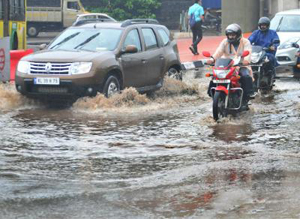Chennai, Dec 13: A day after Cyclone 'Vardah' ripped through Chennai, the city presented a scene of devastation with thousands of uprooted trees, broken billboards and snapped telephone and power cables besides low-lying areas reporting waterlogging.
 Flight operations resumed this morning in the storm-hit city which was limping back to normalcy. The storm, which was the most intense to have hit the Tamil Nadu capital in two decades and left four persons dead, snapped communication lines, flattened homes, and threw into disarry rail, road and air traffic as it crossed the coast here yesterday.
Flight operations resumed this morning in the storm-hit city which was limping back to normalcy. The storm, which was the most intense to have hit the Tamil Nadu capital in two decades and left four persons dead, snapped communication lines, flattened homes, and threw into disarry rail, road and air traffic as it crossed the coast here yesterday.
However, with the rains having abated since morning, people came out on the streets and some of them queued up at roadside tea stalls. Office-goers were seen waiting at bus stops and railway stations with few services being operated. Southern Railway said skeletal services resumed in the MMC, Sulurpettah/Arakkonam section while that on the busy Tambaram-Chengalpattu route were yet to be operated.
Flight operations, which were suspended at the Chennai airport, have resumed. "Flight operations have resumed at Chennai airport today morning," Civil Aviation Minister Ashok Gajapathi Raju tweeted.
Operations at the airport were suspended yesterday due to gusty winds and rainfall. Many flights were either cancelled or diverted to other destinations. In many areas power was yet to restored as uprooted trees had fallen on power lines in the wake of the squally winds that accompanied heavy rains in many parts of the city and surroundings.
Both official machinery and residents themselves were seen clearing fallen trees. Civic workers used hand-held battery-operated wood cutters to remove hundreds of uprooted trees lying on the roads.
People made a beeline to shops and supermarkets to stock supplies including candles which were selling like hot cakes. They were also seen stocking up adequate quantity of drinking water, available in containers as well as bottles.
Water logging was reported in low-lying areas in three affected districts of Kancheepuram, Thiruvallur and Chennai and efforts were on to pump it out. Harried denizens said they had not experienced such a cyclonic storm even as they recalled last year's deluge in these districts.
Thousands of people were evacuated from low-lying areas as roaring wind clocking speed of 100 km an hour uprooted trees, tore off hoardings and toppled cars, yesterday.





Comments
Add new comment